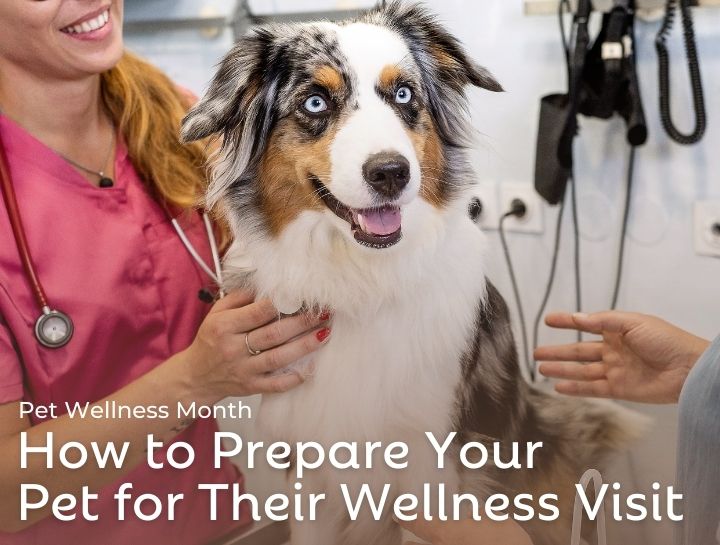Pet Wellness Visits: How to Prepare

October is National Pet Wellness Month! Did you know you shouldn’t wait until your pet is sick to bring it to the vet? Wellness exams are given when an animal is healthy to prevent life-threatening diseases that can be difficult—and expensive—to treat. Scheduling regular wellness exams is one of the most important things you can do to keep your pet happy and healthy throughout its life.
How Often Does My Pet Need a Wellness Exam?
The frequency of your pet’s wellness exams will depend on its age and species. Most full-grown dogs and cats should be seen annually or every six months. After their first visit (usually at 6-8 weeks), puppies and kittens will need wellness exams every 3-4 weeks until they are about 5 months old.
What Does a Wellness Exam Include?
Lifestyle and Health History
Before the physical exam, a team member will ask you about your pet’s diet, behavior, lifestyle, and health history. This is a great time to share any questions or concerns with your veterinary team.
Physical Exam
In between giving treats and cuddles, our team will get a full picture of your pet’s health from head-to-tail by:
- Measuring its weight, pulse, and rate of breathing
- Listening to the heart and lungs
- Checking joints, eyes, ears, skin, and teeth
- Observing your pet’s alertness and reflex responses
- Feeling the organs and lymph nodes in the abdomen
- Checking the rest of your cat’s body for unusual lumps and/or pain
Routine Diagnostic Tests
Depending on your pet’s age and medical history, your veterinarian may recommend the following tests:
-
Heartworm testing (blood parasite screening)
-
Fecal testing. This allows the veterinarian to check for the presence of internal parasites such as hookworms, round worms, and whipworms.
-
Blood work. Blood tests screen for infection or disease that may not otherwise be detected through a physical examination. Blood work also allows a veterinarian to assess your pets’ health comprehensively.
Vaccinations
Lastly, your pet’s wellness exam will include preventative care, like vaccinations. The vaccinations your pet gets are vital for their health, the health of other animals, and even the health of the people your pet interacts with.
What Vaccines Will My Pet Get?
Puppies and kittens are usually protected from infectious diseases by their mother’s milk if she has been adequately vaccinated herself. However, this protection only lasts for a short while.
- Puppies should be vaccinated at 8, 11, and 14 weeks.
- Kittens should be vaccinated at 9, 12, and 15 weeks.
- Boosters should be given 12 months after the date of the last vaccination.
- If you have an older pet, your veterinarian can advise you on the correct vaccination protocol to follow.
Dogs should be routinely vaccinated against:
- Canine distemper
- Canine parvovirus
- Infectious canine hepatitis
- Leptospirosis Rabies
If your dog is going to spending time in kennels, you should also inquire about getting them vaccinated against kennel cough. The vaccine is usually given via the nostrils and protects against bordetella bronchiseptica and parainfluenza virus.
Cats should be routinely vaccinated against:
- Feline calicivirus
- Feline herpes virus
- Feline infectious enteritis
Ask your veterinarian if your kitten or immune-compromised cat should be vaccinated against feline leukemia virus.
Rabbits should be routinely vaccinated against:
- Myxomatosis
- Rabbit (viral) hemorrhagic disease (RHD)
How Should I Prepare for My Pet’s Wellness Exam?
-
Bring a list of your pet’s food, medications, lifestyle habits, and health concerns.
-
Keep your cat calm. Treats, toys, or a familiar blanket from home can help keep your pet calm while they’re at the clinic.
-
Gently introduce your cat to its carrier. Keeping your pet’s carrier out and open in your home (and stocked with some favorite toys and treats) will help lower their stress when it’s time for a vet visit.
Schedule Your Pet’s Next Wellness Exam
The old saying is true: an ounce of prevention is better than a pound of cure. Not only do regular wellness exams keep your cat healthy and happy, but they will also likely allow you to save on veterinary expenses over the long term. Bartels Pet Hospital is here to help your cat live a long and happy life. Call us at (440) 526-4818 to request an appointment or book online today!
